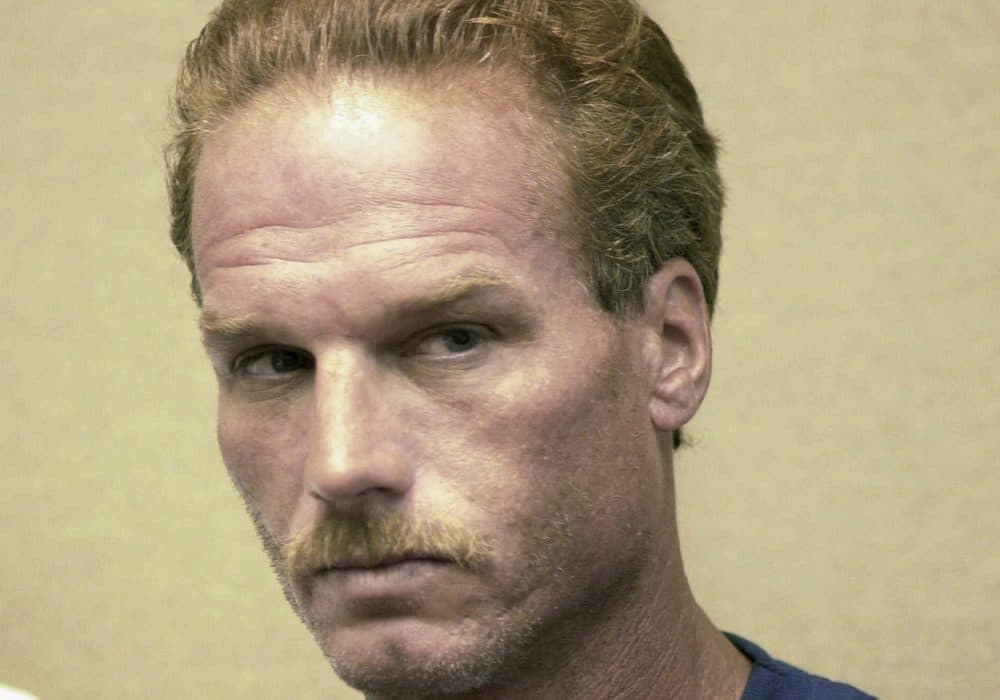Advertisement
Juror Who Opposed Death Penalty For One Of Sampson's Killings Speaks Out

Imagine sitting on a jury when your duty is to decide whether you should sentence a man to execution. And imagine yourself alone, with 11 fellow jurors pushing for the opposite verdict.
Two weeks ago, a federal jury in Boston became only the second jury in Massachusetts in a half century to impose the death penalty.
Prosecutors were seeking two death penalty sentences for two killings committed by Gary Lee Sampson in 2001. But one of the jurors held out and then caused a sensation by slipping a letter intended for the judge into the envelope with the verdicts.
A Conversation With The Holdout Juror
Gregory Gadbois wants to make it clear. He was on the jury's side when it came to deliberating the evidence in the killing of Jonathan Rizzo. The heinousness of the crime involved more than the stab wounds, he says.
"It was the kind of morality, the decision that it's OK for me to do this for my convenience. I can kill people," Gadbois said. "That's exactly what a terrorist does."
We found Gadbois after the judge in the case released the list of jurors in response to a motion filed by WBUR.
Gadbois said that by the end of the trial, even the jurors who didn't believe in the death penalty agreed that capital punishment was necessary for defendants like Sampson.
But when it came to the killing of Philip McCloskey, the first of the two Good Samaritans who had given a ride to the hitchhiker, there was one juror who held out against the death penalty.
"And that was me," Gadbois said. "I do believe there was a difference in the murders. ... I only took that vote on McCloskey because ... it wasn't premeditated. I believe it wasn't premeditated."
Advertisement
The 58-year-old physicist wanted more certainty, a higher level of proof. When Sampson confessed to police, he said he had intended to kill Rizzo from the start of that encounter, but he said he had no such plan when he first carjacked McCloskey.
"It was a stupid person doing this awful thing, but not premeditated," Gadbois said.
Gadbois said he needed time, he needed the weekend to think, and his best thinking is through his writing.
By Monday his doubt and his votes for the death penalty in one killing, and against in the other, were firm.
When fellow jurors asked about justice for the McCloskey family, Gadbois said that two different crimes with different character deserved two different verdicts.
"I just told them, I'm not going to move on this," he said. "'I mean, we're going to give him the death penalty anyway. It's going to kill him. That's good.' "
Issues With The Federal Law
What Gadbois did next threw the jury into disarray. Over the weekend he had decided to make his views on the law clear to the court. He had typed a letter. And after the jury reached its verdicts on the Monday, he slipped it into the envelope with the verdicts.
"The thing that bothered me so bad was the stupid law," Gadbois said. "I think the law they were prosecuting under is unconstitutional."
He argues, as have other civil libertarians, that the killings should have been prosecuted as straight-up murders under state law and in a state court. Instead Sampson's killings were pursued by the government under the federalized crime of "carjacking that results in death." The federal charge enabled the use of the death penalty, absent in the state court. But the federal claim to jurisdiction is because the vehicles that were carjacked were manufactured in one state and transported across state lines to another state.
"There's no logical need of justice that can't be served in the state court," Gadbois said.
An interesting argument, perhaps, but completely divorced from Gadbois' role as a juror. It appalled his fellow jurors when they found Gadbois' letter in the verdict form. And its existence stunned the court, which hadn't read it yet.
"It's not about Sampson," the juror said. "It's not about, is he innocent or is he guilty? It's about the law itself. It's outside the trial."
And when the judge opened the letter and read it, that's what he ruled. By then the jurors were all home, their verdicts rendered.
This segment aired on January 25, 2017.
